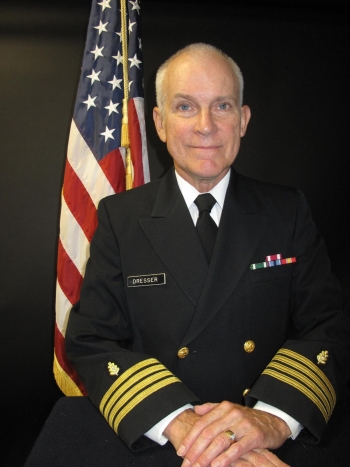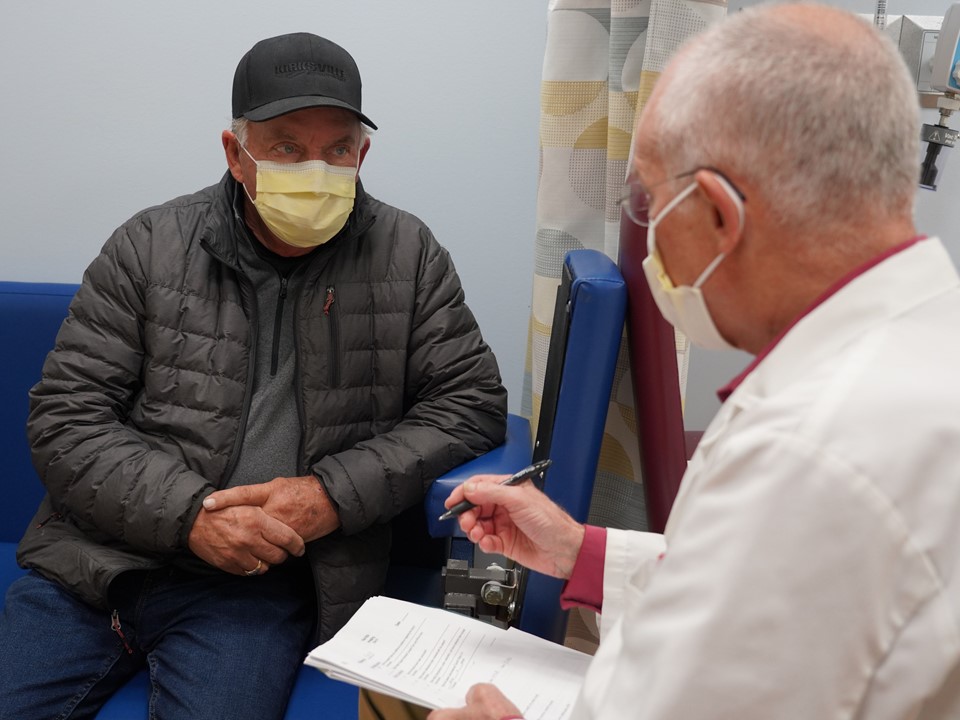The following feature is part of the series, VA Researchers Who Served. These profiles bring to life the critical work that VA researchers are doing for the Veteran community and highlight and recognize their military service, while including a touch of human interest and an inspirational tone.
Dr. Thomas Purinton Dresser, a Navy Veteran, is the chief of nuclear medicine at the Harry S. Truman Memorial Veterans’ Hospital in Missouri. As a general nuclear medicine physician, he performs a range of diagnostic and therapeutic procedures. He has authored 31 papers, mainly on nuclear medicine, which involves the use of radioactive drugs pharmaceuticals in research, diagnosis and treatment. He is also a clinical professor in radiology and medicine at the University of Missouri, where he earned a doctorate in physiology in 1972 and a medical degree in 1974. He served in the Navy Medical Corps from 1971 to 1992, reaching the rank of captain in 1987. His awards include the National Defense, Humanitarian Service, Navy Commendation and Meritorious Service medals.
What motivated you to join the military?

Dresser, a Navy Veteran, is co-authoring a clinical trial focusing on the effectiveness of a drug to spot the location of prostate cancer in the body.
My grandfather, Thomas Purinton, enlisted in the Navy at age 16 in 1899 and was assigned to the square-rigger USS Essex, and my Massachusetts ancestors fought in the Revolutionary War, so I was favorably disposed to military service. When I was a second-year medical student in 1971, one of my colleagues was accepted into the Medical Osteopathic Scholarship Program, which is the Department of Defense program to recruit future physicians. I was accepted, too, and became a Navy ensign on active duty while I completed medical school.
What inspired your research career?
Since my childhood, I have had an analytical and quantitative view of the world. As my academic skills developed, I could apply these interests in a meaningful way. I came to see academic medicine in the military and VA as encouraging environments to pursue research. When I first applied for a Navy medical scholarship in the 1970s, Dr. Donald Custis was the surgeon general of the Navy. [He was later VA’s chief medical director.] I remember that very vividly because I applied and was not accepted. Then I wrote a personal letter to him saying, ‘I really, really, really want to join the Navy and be a Navy doctor.’ I was accepted two weeks later.”
When and where did you serve in the military? Describe your military experience.
I served at a naval hospital in Oakland, California, from 1974 to 1992. After training in internal medicine and nuclear medicine, I became a staff physician, department head and service line chief. In 1985, I became head of the department of research. In 1986, I was surgeon for an amphibious squadron and served aboard the USS New Orleans, an amphibious assault ship. Understanding and using the operational structure of the military has been a major positive influence in my professional career.
What kinds of research are you involved in? How does it potentially impact Veterans?
Myocardial perfusion imaging is very useful in evaluating Veterans with heart disease. Analyzing 50,000 patient studies has resulted in many publications, and it served as a basis to establish a training program for physicians in the Cardiovascular Disease Fellowship where I am director. Currently, with my colleague Dr. Timothy Hoffman, we are carrying out a Phase III clinical trial of Ga68-PSMA-11, a radiopharmaceutical that eases the process in spotting cancer, for evaluating patients with carcinoma of the prostate. This type of radiopharmaceutical appears to be the best diagnostic tool for evaluating the stage of the prostate cancer and whether it has metastasized in the body.
More Information
Click here to read the full story.
Click here to learn more about VA research.
Topics in this story
More Stories
Bob Jesse Award celebrates the achievements of a VA employee and a team or department that exemplifies innovative practices within VA.
The Medical Foster Home program offers Veterans an alternative to nursing homes.
Watch the Under Secretary for Health and a panel of experts discuss VA Health Connect tele-emergency care.






